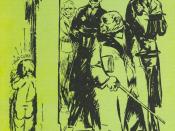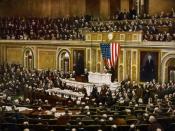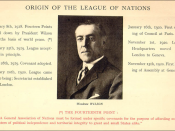The "Big 3", Georges Clemenceau, Woodrow Wilson and Lloyd George, disagreed so strongly on the Treaty of Versailles because it was no more than a compromise, it satisfied nobody. All three of them had a different stance on whether or not the treaty was satisfactory. Clemenceau thought it would be better for Germany to suffer a great deal more than the treaty allowed, while Wilson considered the treaty far too harsh. Lloyd George on the other hand took what seemed to be more of a middle ground.
Clemenceau had personally been a witness to the devastation in France's north east corner at Germany's hand, and saw fit to make sure that Germany never be able to do it again. Although he was content with clause 231, in which Germany accepts the blame for the entire First World War, he thought that the reparation charges placed on Germany should have been higher.
He wanted them so high that Germany would be crippled paying them off forever. He also wanted Germany split up into tiny pieces which would render the country powerless and easy to overpower. Clemenceau did like some aspects of the treaty, such as the disarmament limiting the German military to 100,000 men, 6 battle ships, no U-boats and no air force.
Woodrow Wilson was also forlorn when it came to the treaty as most of his "fourteen points" were either ignored or rejected. He believed the treaty was far too cruel towards the Germans and that the Allies should have been more forgiving. The two points he did manage to achieve were those about the League of Nations, and national self determination, but both of them had their downsides. After returning home from Europe, Wilson discovered the senate refusing to sign the treaty, as well as join the...


